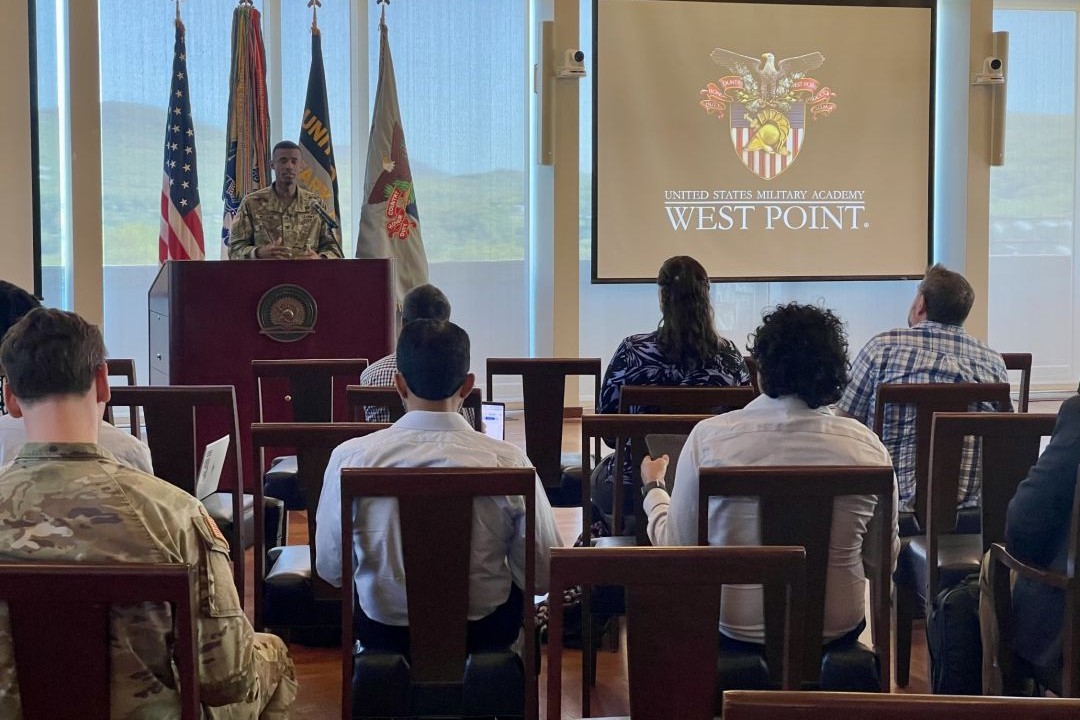The Department of Law & Philosophy (DELPHI) supports a wide range of philosophy-related research projects for cadets and faculty. This work reflects the United States Military Academy's (USMA) commitment to preparing future Army officers who can think critically, act ethically, and lead with integrity in complex and evolving environments.
At USMA, this means:
At USMA, philosophical education is about ensuring that the officers of tomorrow are not only ethically grounded and operationally effective, but also intellectually versatile - ready to navigate a world where specific challenges evolve rapidly, but the need for rigorous, multidimensional thinking remains constant.

Training Ethical Employment of Lethal Autonomous Weapons Systems (TEELAWS) is a collaboration between USMA, DELPHI, and Perceptronics Solutions, a California-based software company. The project is developing an interactive software module designed to teach human beings to collaborate with AI-enabled machines, while maintaining appropriate levels of human judgment in the use of those machines.
Cadets enrolled in this capstone research project conduct philosophical research to develop an ethical framework, approach, and scenarios to be implemented in the software. The software produced by the program will be utilized in classrooms at West Point to complement cadets' instruction in various academic disciplines. This valuable instructional tool will help cadets develop critical artificial intelligence (AI) literacy and challenge them to think in detail about the kinds of technology that they will be responsible for in the future.
TEELAWS also aims to better understand the unique challenges of preparing soldiers to use AI effectively and ethically, so that TEELAWS can inform the Army's efforts to operationalize machine autonomy.

DELPHI is working closely with the Strategic Technology Office (STO) at the Defense Advanced Research Projects Agency (DARPA) on a project called ASIMOV. ASIMOV, which stands for Autonomy Standards and Ideals with Military Operational Values, is developing a means of quantifying the performance of autonomous systems relative to a given use case or mission type.
This effort seeks to provide a means of decomposing our values into a quantifiable framework that will help commanders align system performance with operational need and inform risk decisions. The project kicked off in October 2024, and DELPHI has been closely integrated with the effort. COL Kevin Schieman, a USMA Academy Professor, is working with the DARPA team, providing both disciplinary expertise on the responsible use of artificial intelligence and a military operational perspective.
The department hosted a major program milestone event this past spring, showcasing the faculty’s strengths in the law and ethics of armed conflict, and a capstone research presentation from two cadets in the Class of 2025.

Moral Terrain Coaching is an ongoing research initiative that began in the former Department of English and Philosophy, transitioned to the Simon Center for the Professional Military Ethic, and has been integrated with Cadet Summer Training. The program coaches leaders to use psychophysiological indicators (e.g., increased heart rate, sweating, etc.) to identify ethically fraught situations in a military training environment.
Moral Terrain Coaches are integrated into conventional military training scenarios, providing structured post-mission feedback to military leaders to enhance their recognition of moral factors in decision-making and improve outcomes.

In collaboration with the Army’s Artificial Intelligence Integration Center (AI2C), DELPHI is reviewing Responsible AI processes across various Department of Defense agencies. The goal of this capstone research effort is to understand how various organizations have approached responsible development and use of artificial intelligence, and to provide a characterization of lessons learned and best practices.
Want to learn more about becoming an academic instructor in the Department of Law & Philosophy?